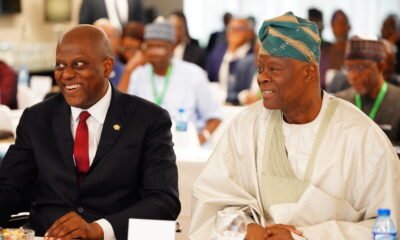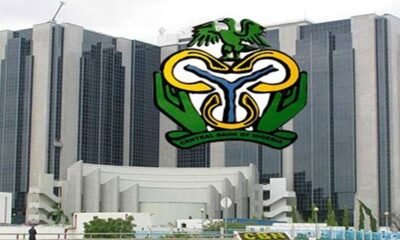Business
How CBN’s Input In Financing Government’s Budget Aids Inflation

By Tolulope Oke
As long as the Central Bank of Nigeria (CBN) finances a sizable portion of the government budget, bringing down inflation will be challenging.
This was disclosed in Nigeria’s Integrated National Financing Framework (INFF) a report commissioned by the Federal Republic of Nigeria, UNDP, World Bank, and the IMF.
The report highlighted a number of issues that make it challenging for the nation to raise money for its development priorities, which may limit its ability to reach the SDGs.
The INFF is viewed as a mechanism to strengthen SDG financing without raising public debt and contingent liabilities to levels that will be damaging to economic sustainability, according to President Buhari, who also signed the document.
“The Integrated National Financing Framework (INFF) has been developed to map out a much-needed sustainable financing plan for Nigeria to deliver on our commitments and aspirations to attain the United Nations’ Sustainable Development Goals (SDGs) by the year 2030.”
The ability to anticipate revenues effectively is cited in the report as a significant problem in the federal government’s budgeting process.
“Revenue targets have often been miscalculated, resulting in the need for the CBN to provide emergency financing, hence further complicating the debt and macro challenges. Accurate revenue forecasting and careful revenue planning must be adopted in the budget process, using reliable data, and realistic forecast models. This will improve the chances of making reliable forecasts.”
- READ ALSO: NNPCL Declares Profit After Tax, Rakes Billions | See Details
- READ ALSO: BREAKING: FG Sues Facebook, Instagram, WhatsAPP, Seeks 30bn Penalty
About the damage fuel subsidies have done to the economy, the report stated that: “the recent oil revenue loss for the federal government is partly due to the re-emergence of implicit fuel subsidies since January 2021. This is because subsidy costs are deducted from oil revenues accruing to the federation account by the national oil company (NNPC). Thus, implicit fuel subsidies are one of the key drivers of revenue loss.”
In light of this, the reported suggested that the government should work on reducing inflation.
“Bringing down inflation will be difficult as long as a significant share of the government’s budget is financed by the Central Bank of Nigeria (CBN). While the government is taking steps to minimize interventions by the CBN, mobilising additional fiscal revenues for financing SDGs could reduce the need for ongoing Central Bank financing of budget deficits and help CBN to establish a credible nominal anchor to bring inflation to a low and stable path,” it reads.
The report added that “improving infrastructure is a second urgent priority. Unreliable power supply for industries and companies to function efficiently and profitably, the inability to get goods to market without delay, and an underdeveloped ICT infrastructure to enable a modern digitalised economy are some infrastructure challenges the country faces.





























Akeju Olagbaju Mudasiru
October 6, 2022 at 7:54 am
I am surprised it took a long time for the Guru of Economics in this country to know the implication of this CBN intervention. Budgets are made with specific targets including cap on inflation and assumptions and predictions are made to achieve that.
When extraneous funding are deliberately injected it distorts the whole process and this is the result we are getting